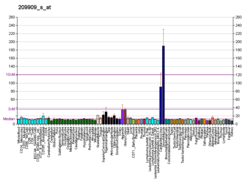●Create account
●Log in
●Create account
● Log in
Pages for logged out editors learn more
●Contributions
●Talk
Contents
(Top) 1 Further readingTGF beta 2
●العربية ●Cymraeg ●Español ●Français ●Galego ●مصرى ●Українська Edit links ●Article ●Talk ●Read ●Edit ●View history Tools Actions ●Read ●Edit ●View history General ●What links here ●Related changes ●Upload file ●Special pages ●Permanent link ●Page information ●Cite this page ●Get shortened URL ●Download QR code ●Wikidata item Print/export ●Download as PDF ●Printable version Appearance From Wikipedia, the free encyclopediaThis article includes a list of references, related reading, or external links, but its sources remain unclear because it lacks inline citations. (March 2019) |
Transforming growth factor-beta 2 (TGF-β2) is a secreted protein known as a cytokine that performs many cellular functions and has a vital role during embryonic development (alternative names: Glioblastoma-derived T-cell suppressor factor, G-TSF, BSC-1 cell growth inhibitor, Polyergin, Cetermin). It is an extracellular glycosylated protein. It is known to suppress the effects of interleukin dependent T-cell tumors. There are two named isoforms of this protein, created by alternative splicing of the same gene (i.e., TGFB2).
Further reading
[edit]- Clark DA, Coker R (1998). "Transforming growth factor-beta (TGF-beta)". Int. J. Biochem. Cell Biol. 30 (3): 293–8. doi:10.1016/S1357-2725(97)00128-3. PMID 9611771.
- Wick W, Platten M, Weller M (2002). "Glioma cell invasion: regulation of metalloproteinase activity by TGF-beta". J. Neurooncol. 53 (2): 177–85. doi:10.1023/A:1012209518843. PMID 11716069. S2CID 21461718.
- Bissell DM (2002). "Chronic liver injury, TGF-beta, and cancer". Experimental & Molecular Medicine. 33 (4): 179–90. doi:10.1038/emm.2001.31. PMID 11795478.
- Kalluri R, Neilson EG (2004). "Epithelial-mesenchymal transition and its implications for fibrosis". J. Clin. Invest. 112 (12): 1776–84. doi:10.1172/JCI20530. PMC 297008. PMID 14679171.
- Daopin S, Piez KA, Ogawa Y, Davies DR (1992). "Crystal structure of transforming growth factor-beta 2: an unusual fold for the superfamily". Science. 257 (5068): 369–73. Bibcode:1992Sci...257..369D. doi:10.1126/science.1631557. PMID 1631557.
- Schlunegger MP, Grütter MG (1992). "An unusual feature revealed by the crystal structure at 2.2 A resolution of human transforming growth factor-beta 2". Nature. 358 (6385): 430–4. Bibcode:1992Natur.358..430S. doi:10.1038/358430a0. PMID 1641027. S2CID 4239431.
- Noma T, Glick AB, Geiser AG, et al. (1992). "Molecular cloning and structure of the human transforming growth factor-beta 2 gene promoter". Growth Factors. 4 (4): 247–55. doi:10.3109/08977199109043910. PMID 1764261.
- Bodmer S, Podlisny MB, Selkoe DJ, et al. (1990). "Transforming growth factor-beta bound to soluble derivatives of the beta amyloid precursor protein of Alzheimer's disease". Biochem. Biophys. Res. Commun. 171 (2): 890–7. doi:10.1016/0006-291X(90)91229-L. PMID 2119582.
- Webb NR, Madisen L, Rose TM, Purchio AF (1989). "Structural and sequence analysis of TGF-beta 2 cDNA clones predicts two different precursor proteins produced by alternative mRNA splicing". DNA. 7 (7): 493–7. doi:10.1089/dna.1.1988.7.493. PMID 2850146.
- Madisen L, Webb NR, Rose TM, et al. (1988). "Transforming growth factor-beta 2: cDNA cloning and sequence analysis". DNA. 7 (1): 1–8. doi:10.1089/dna.1988.7.1. PMID 3162414.
- Barton DE, Foellmer BE, Du J, et al. (1989). "Chromosomal mapping of genes for transforming growth factors beta 2 and beta 3 in man and mouse: dispersion of TGF-beta gene family". Oncogene Res. 3 (4): 323–31. PMID 3226728.
- de Martin R, Haendler B, Hofer-Warbinek R, et al. (1988). "Complementary DNA for human glioblastoma-derived T cell suppressor factor, a novel member of the transforming growth factor-beta gene family". EMBO J. 6 (12): 3673–7. doi:10.1002/j.1460-2075.1987.tb02700.x. PMC 553836. PMID 3322813.
- Marquardt H, Lioubin MN, Ikeda T (1987). "Complete amino acid sequence of human transforming growth factor type beta 2". J. Biol. Chem. 262 (25): 12127–31. doi:10.1016/S0021-9258(18)45325-2. PMID 3476488.
- Philip A, Bostedt L, Stigbrand T, O'Connor-McCourt MD (1994). "Binding of transforming growth factor-beta (TGF-beta) to pregnancy zone protein (PZP). Comparison to the TGF-beta-alpha 2-macroglobulin interaction". Eur. J. Biochem. 221 (2): 687–93. doi:10.1111/j.1432-1033.1994.tb18781.x. PMID 7513640.
- Lin HY, Moustakas A, Knaus P, et al. (1995). "The soluble exoplasmic domain of the type II transforming growth factor (TGF)-beta receptor. A heterogeneously glycosylated protein with high affinity and selectivity for TGF-beta ligands". J. Biol. Chem. 270 (6): 2747–54. doi:10.1074/jbc.270.6.2747. PMID 7852346.
- Hildebrand A, Romarís M, Rasmussen LM, et al. (1994). "Interaction of the small interstitial proteoglycans biglycan, decorin and fibromodulin with transforming growth factor beta". Biochem. J. 302. ( Pt 2) (2): 527–34. doi:10.1042/bj3020527. PMC 1137259. PMID 8093006.
- López-Casillas F, Payne HM, Andres JL, Massagué J (1994). "Betaglycan can act as a dual modulator of TGF-beta access to signaling receptors: mapping of ligand binding and GAG attachment sites". J. Cell Biol. 124 (4): 557–68. doi:10.1083/jcb.124.4.557. PMC 2119924. PMID 8106553.
- Fromigué O, Marie PJ, Lomri A (1998). "Bone morphogenetic protein-2 and transforming growth factor-beta2 interact to modulate human bone marrow stromal cell proliferation and differentiation". J. Cell. Biochem. 68 (4): 411–26. doi:10.1002/(SICI)1097-4644(19980315)68:4<411::AID-JCB2>3.0.CO;2-T. PMID 9493905. S2CID 85850306.
- Mori T, Kawara S, Shinozaki M, et al. (1999). "Role and interaction of connective tissue growth factor with transforming growth factor-beta in persistent fibrosis: A mouse fibrosis model". J. Cell. Physiol. 181 (1): 153–9. doi:10.1002/(SICI)1097-4652(199910)181:1<153::AID-JCP16>3.0.CO;2-K. PMID 10457363. S2CID 21284888.
- ^ a b c GRCh38: Ensembl release 89: ENSG00000092969 – Ensembl, May 2017
- ^ a b c GRCm38: Ensembl release 89: ENSMUSG00000039239 – Ensembl, May 2017
- ^ "Human PubMed Reference:". National Center for Biotechnology Information, U.S. National Library of Medicine.
- ^ "Mouse PubMed Reference:". National Center for Biotechnology Information, U.S. National Library of Medicine.










